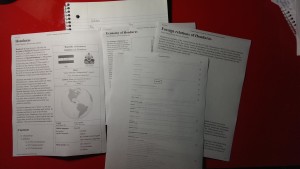1. Read your background guide:
Regardless of how long it is, read your background guide. It’s easily the most important research you can do, and it’s given to you with no extra work involved. Everyone in else in committee will have read it and will most likely refer to it multiple times throughout the conference. As you read, underline the problems that are brought up, and start brainstorming solutions. Pay close attention to case studies, bold terms, and any parts that mention your country by name. After you finish reading, you should be able to answer important questions about your committee. Who or what do the problems apply to? Are any nations responsible for the issues? Are the issues urgent, or do they require long term solutions? Are the topics related? If so, how?
2. Learn about your country:
After you get a decent idea of the problems your committee will be addressing, it’s crucial to understand how they apply to your country. Use the CIA World Factbook as well as Wikipedia to find out the basics of your country (usually the country’s main Wiki will be enough, but there are also typically Wiki pages about a nation’s economy and foreign relations). Where is your country located? Is your country developed or developing? What’s the average GDP per capita? What is its economy dependent on? What are its major imports/exports? Is it involved in any world conflicts? Does it have any major allies? Enemies?
Apart from answering these questions, make sure to check major news sources for any current events regarding your nation, region, or committee, and be well versed in how these relate to the topics in your background guide. Take note of all these important characteristics, and continue to brainstorm solutions. At this point, you should be thinking of specific solutions that would benefit your nation, its allies, and the rest of the world.
3. Organize your solutions:
Now that you know the problems your committee addresses, as well as how they apply to your nation, start to write down full solutions to the problems. Write down the pros and cons of your ideas. Do they address all nations, or just nations similar to yours? Are they moral? Are they expensive? If so, how will you fund them? How do they affect the impoverished? Will most nations agree to the solutions? Do they fall under the jurisdiction of your committee? Are they long term solutions, short term solutions, or both? What are the overall, economic, political, and social repercussions of your solutions?
4. Strengthen your solutions:
If you find yourself with any more time, it is important to refine your solutions. Start looking up statistics, redundancies, and specific UN resolutions. Do your solutions already exist? If so, how can you improve upon existing solutions? Are there any statistics that back up the urgency of the problems you plan to address? Have similar solutions worked in the past? How have past attempts at solving the problems failed? Are there any specific UN programs you can work with? Are there any relevant UN resolutions that you can reference? Are there any NGO’s that tackle the same problems? Are they successful?
Keep asking yourself similar questions until you run out of time, and remember: if you can back up your solutions and prove that they will be successful, despite your lack of preparation, you will seem like the best-researched delegate in the room.



